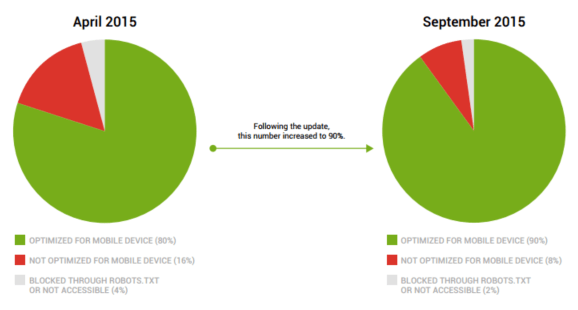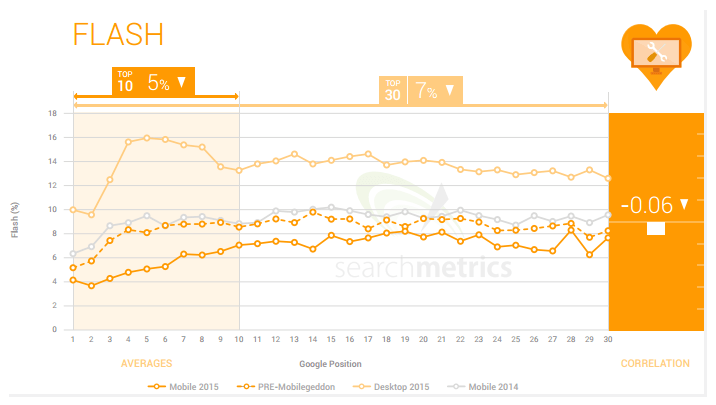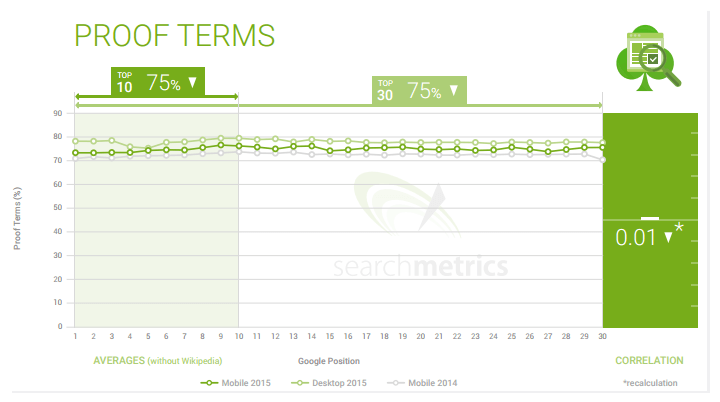Research Reveals What It Takes To Rank In Mobile Search Results
Columnist Jayson DeMers summarizes key takeaways from Searchmetrics' first-ever Mobile Ranking Factors report.

Image Credit: Denys Prykhodov / Shutterstock.com
While most marketers and business owners now understand the importance of having a mobile-friendly site, many aren’t aware of the differences between desktop and mobile search ranking factors.
They take a one-size-fits-all approach to optimizing both their mobile and desktop content — and then often only track desktop rankings. For marketers and business owners looking to rank for mobile search queries, this is a dangerous strategy.
According to Google, we have now passed the tipping point for mobile search queries. In May 2015, the company confirmed that “more Google searches take place on mobile devices than on computers in 10 countries including the US and Japan.” Then, earlier this month, Google noted that mobile searches now exceed desktop searches worldwide.
With this in mind, should marketers be following a separate strategy to help their pages rank for mobile search? In a word, yes, according to a new report (registration required) released by Searchmetrics which provides important insights into which strategies and techniques marketers should be using to rank highly in mobile search results.
Looking at the highest-ranking pages in mobile search, as well as the differences between desktop and mobile rankings, this report reveals which elements marketers should be focusing on in order to optimize for mobile.
How Many Of The Highest-Ranking Domains Are Mobile-Friendly?
In April 2015, Google made “mobile-friendliness” a significant ranking factor for mobile search results through its so-called “Mobilegeddon” update.
According to Searchmetrics’ research, there are a higher percentage of mobile-friendly top 100 domains following this update. Prior to the update, 80 percent of the top 100 domains were mobile-friendly; at last check, 90 percent of these domains are now optimized for mobile.

Source: Searchmetrics’ Mobile Ranking Factors 2015 Report
But what does this mean in practical terms? The rest of this post will break the report’s findings into three factors that impact the mobile-friendliness of a site: technical components, user experience and content.
Technical Components
According to the report, technical issues factor heavily into mobile rankings due to the limited bandwidth and smaller screen size of mobile devices. Following are some of the most significant ranking factors from a technical standpoint:
Site speed. The 10 highest-ranking pages take an average of 1.10 seconds to load. Use Google’s PageSpeed Insights tool to ensure your site is loading quickly.
Flash. The use of Flash elements in mobile rankings has fallen, both compared to last year’s mobile search results and pre-Mobilegeddon. HTML5 should be used in place of Flash to ensure your content displays correctly in both desktop and mobile search.

Only 5% of the top 10 mobile search results integrated Flash in their landing pages.
Keywords in domain. Since Google’s Exact Match Domain (EMD) update in 2012, we’ve seen the positive impact of using keywords in domains fall significantly. According to this report, the incidence of keywords in domains is now even lower in mobile SERPs than in desktop. When choosing your domain name, focus on branding, not keywords.
User Experience
Due to the small screen size of mobile devices, optimizing fonts and other elements is critical to a positive user experience. This section will highlight some of the most important ranking factors for user experience.
Unordered lists. High-ranking mobile pages use more unordered lists than desktop search results. However, these lists tend to be shorter on mobile devices. Use bullets to make your mobile content more scannable, but keep the number of items to a minimum.
Internal links. While the number of internal links within mobile content has increased from last year, mobile content still contains far fewer links than desktop content. Ensure you’re using links meaningfully and that you’re positioning them such that your mobile users can accurately click on them.

The number of internal links rose from 2014, but is still far lower than in desktop results
Images. Top-ranking mobile results contain an average of fewer than four images per page, compared to nine for desktop results. Use images sparingly for your mobile content, and ensure they’re optimized to load quickly.
Content
Content continues to be a significant driver of rankings both for desktop and mobile results. Following are some of the most important factors to focus on when creating and optimizing your mobile content.
Keywords in body. The number of keywords within mobile content rose from 2.7 in 2014 to 5.48 in 2015. This is significantly lower than the average number used in desktop results (10.22).
Word count. Average word count of mobile results increased in 2015 to 868; compare this to desktop’s 1,285. Mobile content should be significantly shorter than desktop content but still long enough to cover the topic comprehensively.
Proof terms. High-ranking mobile results continue to use more proof terms — terms that are very closely related to the main keyword(s) of the page. If you’re doing a good job of covering all aspects of your topic, proof terms are more likely to be included naturally.

The use of proof terms has increased in 2015.
Flesch readability. Surprisingly, top-ranking mobile pages had slightly more complicated content than desktop pages. However, the readability level for both mobile and desktop results fell in the mid-70s range; ensure your content falls close to this standard score using the online Readability Score tool found here.
Additional Findings
While the findings above for technical elements, user experience and content are perhaps the most significant, there are a few additional findings that bear mentioning:
Strong social signals correlate with high rankings. The report revealed a high correlation between social signals and rankings. In other words, high-ranking content tends to have a high number of social shares.
This does not, however, suggest a direct cause/effect relationship. High-ranking pages will naturally get more exposure and visibility, resulting in increased social shares.
Inbound links appear to be declining in importance. Mobile pages had about half as many links as desktop pages, and the report authors believe the importance of links is on the decline. This is likely due to the fact that mobile content is more often shared socially than through direct links.
Did any of the mobile ranking factors above surprise you? Which one(s)?
Contributing authors are invited to create content for Search Engine Land and are chosen for their expertise and contribution to the search community. Our contributors work under the oversight of the editorial staff and contributions are checked for quality and relevance to our readers. The opinions they express are their own.
Related stories
New on Search Engine Land